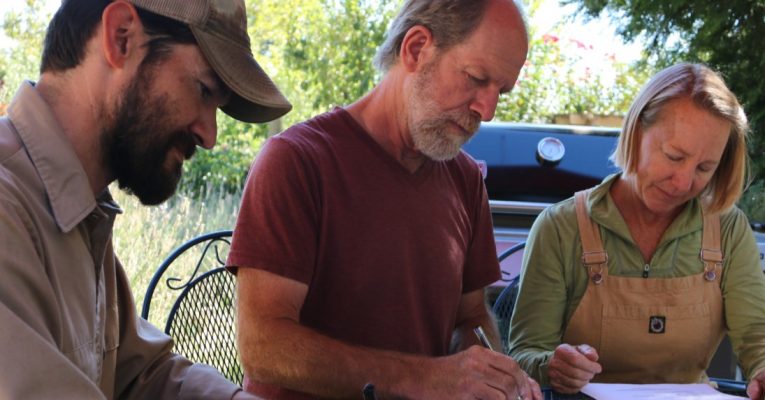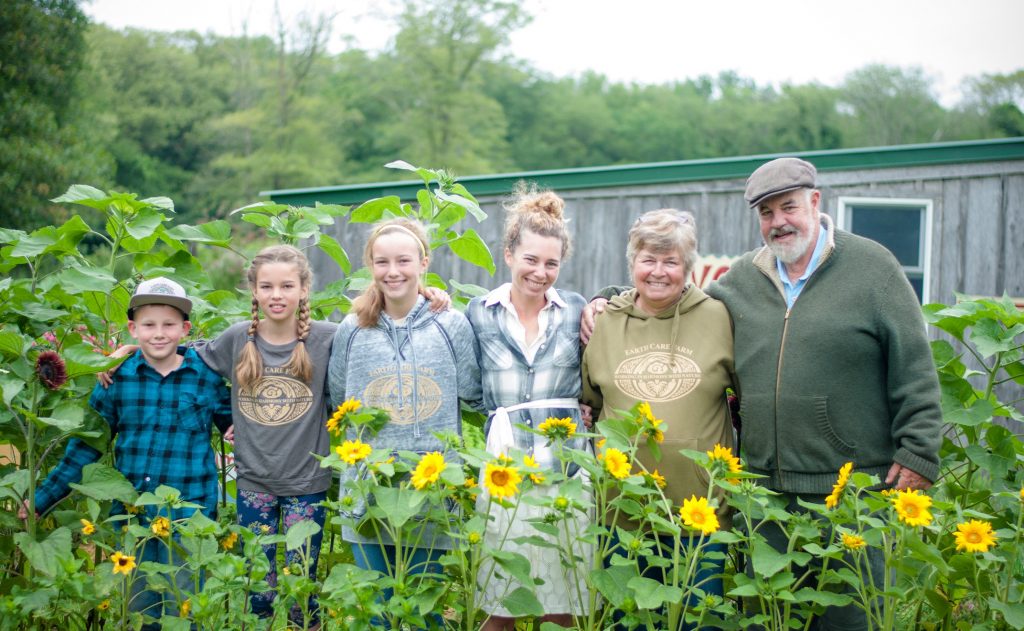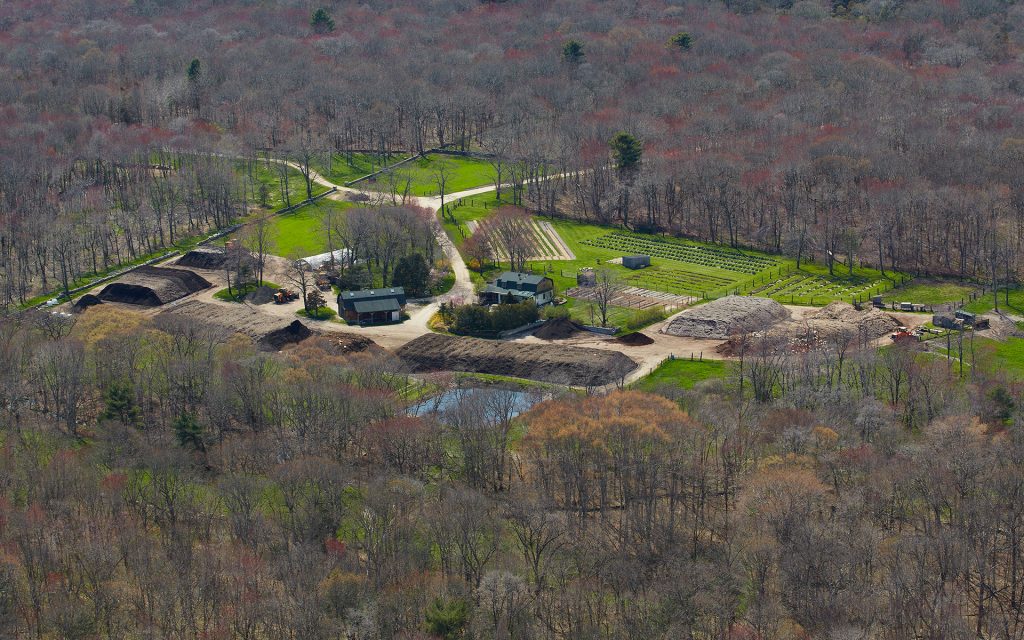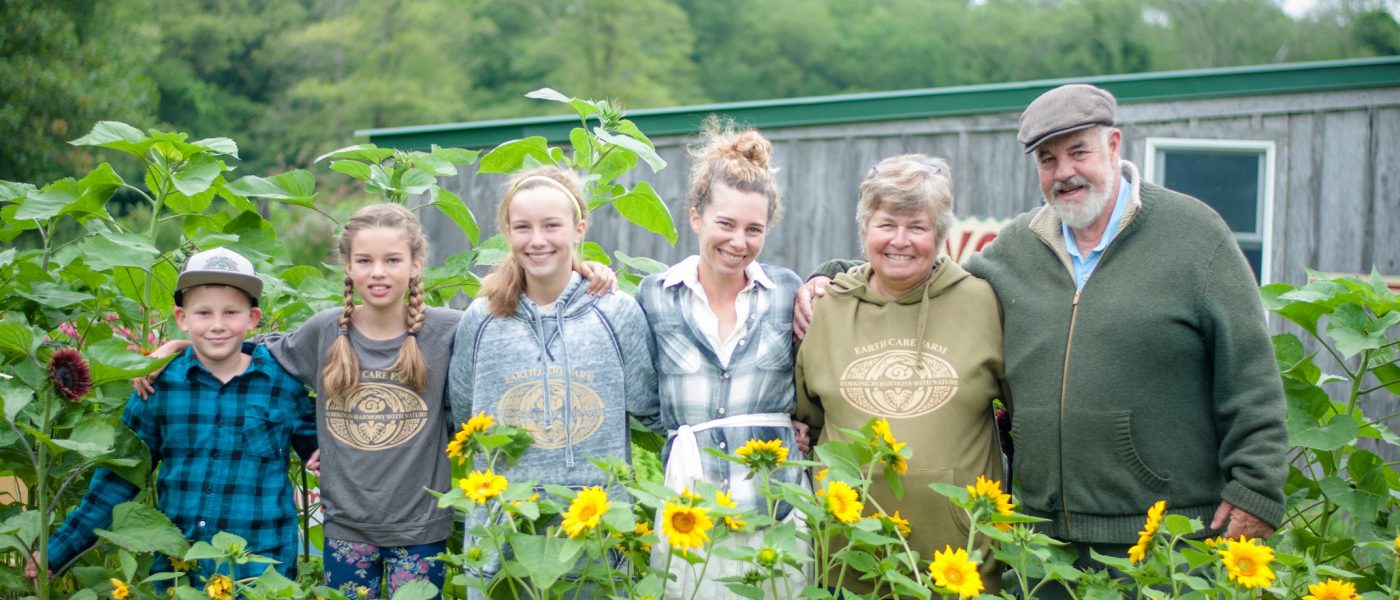Farm Aid partners with organizations all over the country to work towards our mission of creating a family farm-centered system of agriculture in America. Since our first concert in 1985, we’ve granted over $24 million to more than 300 organizations, creating a strong network of allies to keep family farmers on the land. Each year, grantees report back on what they’ve accomplished.
This post features a few stories from our grantees who are helping farmers pass on their valuable farmland to the next generation.
We’ve condensed and edited each statement for clarity, but the following are our grantees’ own stories in their words. We hope you’ll be as inspired as we were by the uplifting work that’s happening all over our country.
California FarmLink
FarmLink is dedicated to educating their local farming community and providing direct assistance to farm families undertaking business succession and transfer planning. So far, their “Agrarian Elders and the Next Generation” initiative has engaged 57 farmers and would-be successors as it prepares a new, intensive farm business succession curriculum and educational offering to serve family farms across the state of California.
Just three miles outside of Nevada City, CA, sits Riverhill Farm. This 10-acre farm was envisioned as a community-based farm when it was started by Alan Haight and Jo McProud in 2001.

Photo: Riverhill Farm owners Alan Haight and Jo McProud sign a lease agreement with their farm manager Antonio Garza. Facilitated by California FarmLink, this unique agreement allows Alan to retire from his role, and provides Antonio a long-term management horizon to succeed as the primary farm operator.
As Alan approached 60, he started thinking about how Riverhill Farm could continue as a source of locally grown food in Nevada County, CA past his retirement. The question facing him was how to simultaneously enhance the value of the business and uphold the community and ecological values that were important to him and Jo.
“It’s exciting for me to assume stewardship of this place. For me, sustainable farming is a multigenerational endeavor so hopefully in another 30-40 years I’ll be able to do the same thing for someone else.” ~Antonio Garza
Around that same time, Antonio Garza stepped onto Riverhill Farm through a local farmer training program. “Antonio was exploring options and indicated he might have an interest in coming to work at Riverhill,” Alan explained. “I realized that if he was going to come, I had to create a job that he would like.” They structured a job for Antonio that included deliberate growth of responsibilities over time.
Alan described Antonio as “a thoughtful person, serious-minded and very curious and engaged in farming from the standpoint of the method, the technique, not just the lifestyle.” Alan noted that after two years of working together, “I was interested in turning the day-to-day management of the farm over to him. That’s a process.” Antonio embraced the opportunity.
That’s where FarmLink came in. They helped develop the lease to support the shared goals of Alan, Jo and Antonio. The document calls for quarterly meetings to bolster regular dialogue and monitor the farm business and operations. It also calls upon Antonio to maintain existing marketing relationships. All of this was facilitated by sharing financial templates for a seamless transfer in terms of income and expenses, and a common framework for future monitoring.
FarmLink worked closely with Alan to design a unique lease agreement that would enable him to retire. Antonio wasn’t positioned to purchase both the business and the land, so a creative lease was the next best solution. They are starting with a three-year lease, and Alan pointed out that they do so with a deep sense of satisfaction rather than a sense of loss. Antonio added, “It’s exciting for me to assume stewardship of this place. For me, sustainable farming is a multigenerational endeavor so hopefully in another 30-40 years I’ll be able to do the same thing for someone else.”
Practical Farmers of Iowa
There’s a strong need in this country to connect beginning farmers to farmland, especially as the average age of the American farmer is now approaching 60. It’s estimated that nearly 100 million acres of farmland will change hands over the next five years. That’s why Practical Farmers of Iowa created a land-matching tool, FindAFarmer.net, which connects landowners with land-seekers. What makes it unique from other real estate websites is the ability for both parties to share their vision and values—helping connect two parties who share similar interests in the farmland’s future.
David Mitschelen was looking for a farmer to take over his family’s 40-acre farm near Winterset, IA. His parents had moved there in 1962, and in 2007, when they could no longer manage it on their own, David purchased it from them. David and his wife planned to retire back to the farm, but decided it was too far from their children and grandchildren. He listed the farm on FindAFarmer, and land-seekers Rory and Lynette Van Wyk replied.
David received a number of inquiries–both through FindAFarmer and from neighbors–but he was impressed with Rory’s interest in sustainable agriculture and his vision for the land. “He looked at the farm the same way I was looking at it, with the possibilities of doing the same type of things I had dreamed of. In a way, he was living out my dream,” explains David.
Rory says, “I started a conversation with the seller and explained our dreams and how we wanted to farm.” Though he received a couple of offers, David ultimately went with Rory and Lynette because he agreed with their vision for the farm.
Now, Rory and Lynette imagine RoLyn Hills Farm growing and becoming more diverse. Eventually they want to offer grass-fed beef, pork, and lamb, pastured broilers, turkeys, and eggs, a variety of fruits and nuts from the orchard, as well as walnut and hickory syrups. As a family farm they wanted their daughters to start their own micro-businesses under the farm umbrella, and eagerly help with daily chores. They use rotational grazing and key line plowing to improve soil health and grazing efficiency.
Conservation Law Foundation
The Conservation Law Foundation’s Legal Food Hub works with farms and food businesses in all stages of development and has helped several early-stage businesses and organizations with legal needs as they get off the ground. Their attorneys have a range of expertise to assist participants at all stages of growth, even with the difficult process of passing on the farm. Since launching the Hub in Rhode Island in late 2016, they have brought in a steady stream of cases and built a broad network of law firms to provide legal services pro bono.

Earth Care Farm
Jayne Merner-Senecal runs her family’s farm, Earth Care Farm, located in Charlestown, RI. Earth Care Farm was started by Jayne’s father, Mike Merner, in 1977. The farm has diversified production of produce, meat, and compost. Jayne currently manages the farm, and she plans to take over ownership of the farm in the future.
Mike Merner’s estate plan originally divided the farm between his three children, but Jayne was the only child who wanted to continue to farm. Jayne and her father worked with a CFL Legal Food Hub attorney to develop a successional plan to protect the farm, which likely would have been sold to developers if not for the Legal Food Hub attorney’s help.

An aerial view of Earth Care Farm.
As Jayne told a reporter for New Food Economy, “If we would have waited for our parents to die…it would have been a nightmare. That’s the kind of thing that splits families.” She added, “The whole family kind of walked away from the process relieved; especially my dad. It really gave him peace of mind.” Jayne is currently the fulltime owner of the farm and is back to focusing on farming, knowing that the future of the land and business is more secure.



